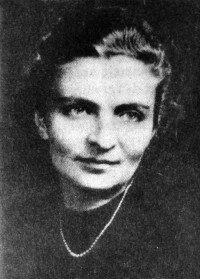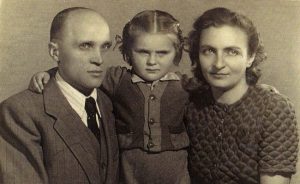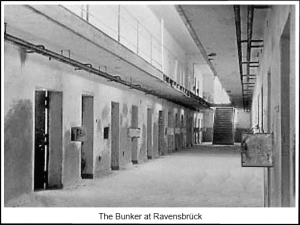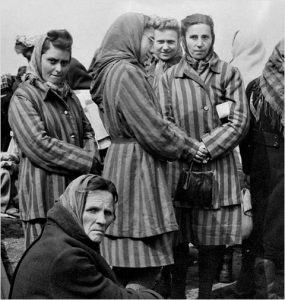This tribute, written by Olha Froliak-Eliashevska in April 1989, is dedicated to Dariya “Oda” Hnatkivska-Lebed, prominent political activist, survivor of Ravensbrück concentration camp, and wife of Ukrainian political leader Mykola Lebed.
Dariya Hnatkivska-Lebed, or “Oda” as she was affectionately known to her friends, was born in the village of Smodna, Kosiv Raion, Ivano-Frankivsk Oblast. She completed her early schooling in Kolomyya and in 1932, graduated from the Gymnasium Ridna Shkola in Lviv. She was a member of Plast Scouting Organization and joined the Organization of Ukrainian Nationalists (OUN) in 1930. She worked as a liaison officer for the OUN Regional Executive Office, and was a member of the OUN Combat Intelligence Group led by Mariya Kos in 1933-1934.

Dariya Hnatkivska and her husband Mykola Lebed were instructed to gather intelligence data on the daily routines and habits of General Bronislaw Pieracki, the Polish Minister of Internal Affairs, who was known for his repressive measures against Ukrainians. On June 15, 1934, Pieracki was assassinated. Dariya Hnatkivska and Mykola Lebed, along with twelve other conspirators were arrested and sentenced for plotting the assassination. Dariya was sentenced to 15 years in prison; Mykola received life imprisonment. They married in the Warsaw prison where they were held. With the invasion of Poland by the German Army in September 1939, Mykola managed to escape from prison and Dariya was released.
In January 1944, the Gestapo arrested and transported Dariya, her baby daughter Zoryana and her elderly mother Oleksandra Hnatkivska to Ravensbrück concentration camp. As a high-ranking member of the Ukrainian resistance movement and wife of Mykola Lebed, Dariya and her infant daughter were placed in solitary confinement, in a punishment block known as the “Bunker”, reserved exclusively for so-called Ehrenhäftlinge (prominent political prisoners).
After the war, Dariya and her family lived in Germany.
They emigrated to the United States in 1950. Dariya Hnatkivska-Lebed passed away on February 24, 1989 and is buried at South Bound Brook Cemetery, New Jersey.

“Shadows billow over me”
Vasyl Stus
Dariya’s elderly mother, Oleksandra Hnatkivska, stood in the row of prisoners during roll call. She lifted her eyes to the sky, a sufferer pleading to the Almighty:
“Remove this heavy stone from my forehead, because it is breaking me.”
She clenched her fists tightly in despair. A sharp pain, like hot burning coals, pierced her heart. Bitter tears welled up in her throat, but refused to escape her eyes. She prayed ... and it appeared that, in the thick morning mist, she saw her daughter Oda and her infant granddaughter Zoya. She stretched out her emaciated arms to touch them, to glance into their eyes… but they moved away, as though distancing themselves, on their way to meet their destiny.
Oleksandra shuddered in horror ... raised her grey-streaked head, looked again into the distance, still seeing their ghostly figures behind the dim cover of day...
Dariya, clutching her infant daughter Zoya in her arms, passed by quickly, hidden somewhere in the middle of the column of prisoners. The gates of the dark stone building - the “Bunker” - slammed shut.

Hot tears streamed down Oleksandra’s face; she buried her face in her hands, her body cringed and shuddered.
A thin beam of sunlight broke through the morning sky, bathing the “Bunker” in a strange golden light.
“Achtung! Aufrecht stehen!” (Attention! Stand up straight!)… shrill whistles, sharp commands and loud barking… and the daily camp grind began again.
Olha Froliak-Eliashevska
Prisoner
No.49061
Ravensbrück concentration camp for women






